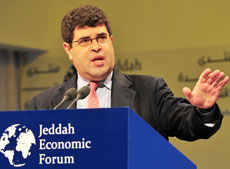JEDDAH: US Deputy Treasury Secretary Neal S. Wolin said the G20 had now become the premier forum for more diverse and balanced coordination of the global economy and had responded quickly to help restore the global financial system. There is growth now in many parts of the world but a number of challenges still exist - market turbulence is still there and as yet, there is no significant job growth.
Addressing the plenary session of global economic governance after the crisis at the 10th Jeddah Economic Forum here on Sunday, moderated by Sulaiman Abdul Rahman Alsheikh, the associate dean of development in the faculty of economics and administration at King Abdulaziz University, Wolin said that there was widespread debate on the global financial crisis and the global financial system was currently undergoing a significant transition, which involved widespread restructuring.
Wolin acknowledged that in the past, the United States had bought too much and saved too little; this was no longer an option. In addition, US public finance must be put on a sustainable track. “The US can no longer be the single driving engine of the world economy. The crisis has shown that the economies of all countries are intertwined and that all nations must do their part to build the new financial system, which must be stronger, safer and sustainable,” he said.
In terms of the core reforms necessary to strengthen the global financial system, Wolin mentioned: Constrain risks; build strong supervision; reform compensation in the financial sector and put an end to the idea that any financial system was “too big to fail.”
Wolin said, “While a strong regulatory framework is necessary, it should be clear that no nation can build this on its own and that all must contribute and work together for sustainable future development.”
Wolin also said the US administration was working closely with Congress to enact regulatory reforms and he hoped it would secure passage this year.
The governance inherent in the IMF (International Monetary Fund) and the World Bank must evolve to reflect the new situation.
Transparency must be improved and more innovations introduced. Progress through partnership with a common purpose must be pursued. It is only by this means that one will be able to create a new and more stable world economy, he added.
The US economy is expected to continue growing this year, although global recovery remains fragile. “In many countries, including my own, GDP numbers have yet to translate into jobs growth,” Wolin said.
Lee Richardson, member of Parliament for Calgary Centre in Canada, presented the Canadian perspective on the recovery of the global economy. Canada is the co-chair of the upcoming 4th G20 summit that will address recovery and new beginnings. “Enlightened self-interest” is perhaps the key to a successful and balanced solution but that solution will only be reached through shared responsibility. The critical areas for the G20 are financial sector reform involving balanced and transparent regulation; continuation of globally coordinated stimulus measures; and enhancement of global trade and growth through resistance to protectionism and the lowering of trade barriers. Narrow sovereignty must be reconsidered, and recovery must lift all countries together. This is possible only through global cooperation, Richardson said.
Bader Al-Dhafa, UN undersecretary general and executive secretary of the Economic and Social Commission for Western Asia (ESCWA), discussed the role of ESCWA in regional Arab integration in a variety of fields with the goal of contributing to world economic recovery. The financial crisis is an excellent opportunity for the Arab countries of ESCWA to show their cooperation and contribute to the recovery because these countries are important to the world economy. Technical and economic cooperation on food issues, regional projects, effectiveness of financial frameworks and economic diversification, as well as more cooperation between governments and the private sector is very important in ESCWA countries to contribute to solving the global financial crisis.
Kazakhstan Minister of Trade and Industry Asset Issekeshev addressed the global financial crisis from the viewpoint of Kazakhstan.
He indicated that a number of factors will allow Kazakhstan to contribute positively to the solution of the global financial crisis. These factors include: Positive GDP growth; a new strategic plan introduced two weeks ago that focuses on diversification and new investments; initiation of Islamic financing in Kazakhstan; and a new customs union linking Kazakhstan, Russia and Belarus.


